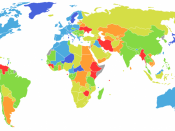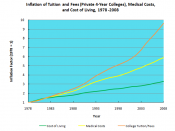Inflation is a sustained rise in the average level of prices. Inflation does not mean a short term increase in prices; it means that prices are rising over a prolonged period of time. Inflation is measured by the percentage change in price level. The inflation rate in the United States was 1.6% in 2002. This means that the level of prices increased 1.6% over the year. Say in year one 1kg of fish costed $1 and say 1kg of meat costed $2, in year 2 the prices doubled respectively to $2 and $4. Here the relative price did not change but absolute prices increased by 100%. Inflation measures changes in absolute prices, not the relative change in prices.
With increase in inflation rate the purchasing power decreases. Now if prices and nominal income rise by the same percentage, it might seem that inflation is not a problem. It does not matter if it takes twice as many dollars now to buy fish and meat than it did before, if we have twice as many dollars in income available to buy the products.
Inflation is very much a problem when a household's nominal income rises at a slower rate than rises. Inflation hurts those household's whose income does not keep up with prices of the goods they buy. In the 1970s in the United States, the rate of inflation rose to near-record levels. Many workers believed that their incomes were lagging behind the rate of inflation, so they negotiated cost of living raises in their wage contracts. The typical cost of living raise, ties salary to changes in the consumer price index. If the Consumer Price Index rises 8% over a year, workers receive an 8% raise plus compensation for experience or productivity increases. As the U.S. rate of inflation fell...


